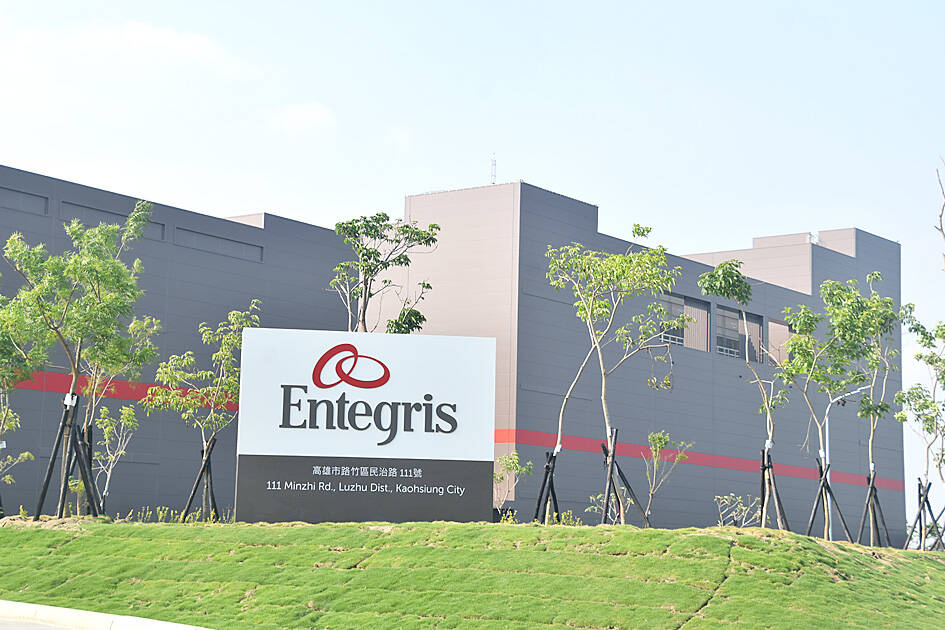Entegris Inc, a supplier of advanced materials and process solutions for the semiconductor and other high-technology industries, said yesterday it has filed a patent infringement lawsuit in Taiwan, alleging its local rival Gudeng Precision Industrial Co (家登) had illegally used two of its patents linked to the manufacturing of front-opening unified pods (FOUP) again.
It is the latest patent lawsuit between the two companies over the past few years. These lawsuits have mostly focused on the production of FOUP, which are used to ship, transport and store wafers during the manufacturing process of wafers and chips.
Entegris said Gudeng has used its technology covered in Taiwan Patent Numbers. 1606534 and 1515159 without the company’s authorization, according to a company statement released yesterday after it filed the lawsuit at the Intellectual Property and Commercial Court of Taiwan.

Photo: Su Fu-nan, Taipei Times
“The patent dispute involves Gudeng’s manufacture and sales of certain diffuser FOUP that use Entegris’ diffuser FOUP technology,” Entegris said in the statement.
The company said it has significantly invested in its research-and-development R&D capabilities and considered its intellectual property to be a key company asset.
“We remain committed to defending our technology with legal steps for any infringement as necessary,” the statement said.
The courts have made judgements in the patent infringement lawsuits involving Entegris and Gudeng these past few years, all of which have favored Entegris, the statement said.
Entegris said it has unwavering commitment to Taiwan and works in close collaboration with the Ministry of Economic Affairs and other local government officials to help advance the local semiconductor ecosystem. Entegris added that it relies on more than 40 local suppliers to provide supplies critical to the semiconductor supply chain.
Gudeng yesterday said in a statement that it has not received the complaint from the court yet. The company was disappointed about the patent infringement allegation lodged by Entegris, the New Taipei City Tucheng District (土城)-based company said.
Gudeng said it highly values intellectual property rights and has spent heavily on R&D efforts to bring new products to the market. Its R&D outlay almost doubled to NT$222 million (US$6.97 million) last year from 2021. That represented about 7 percent of the company’s total revenue last year.
No impact should be seen in its operations, Gudeng said. Gudeng counts Taiwan Semiconductor Manufacturing Co (台積電), Intel Corp and Samsung Electronics Co among its customers.

A wave of stop-loss selling and panic selling hit Taiwan's stock market at its opening today, with the weighted index plunging 2,086 points — a drop of more than 9.7 percent — marking the largest intraday point and percentage loss on record. The index bottomed out at 19,212.02, while futures were locked limit-down, with more than 1,000 stocks hitting their daily drop limit. Three heavyweight stocks — Taiwan Semiconductor Manufacturing Co (TSMC, 台積電), Hon Hai Precision Industry Co (Foxconn, 鴻海精密) and MediaTek (聯發科) — hit their limit-down prices as soon as the market opened, falling to NT$848 (US$25.54), NT$138.5 and NT$1,295 respectively. TSMC's

SELL-OFF: Investors expect tariff-driven volatility as the local boarse reopens today, while analysts say government support and solid fundamentals would steady sentiment Local investors are bracing for a sharp market downturn today as the nation’s financial markets resume trading following a two-day closure for national holidays before the weekend, with sentiment rattled by US President Donald Trump’s sweeping tariff announcement. Trump’s unveiling of new “reciprocal tariffs” on Wednesday triggered a sell-off in global markets, with the FTSE Taiwan Index Futures — a benchmark for Taiwanese equities traded in Singapore — tumbling 9.2 percent over the past two sessions. Meanwhile, the American depositary receipts (ADRs) of Taiwan Semiconductor Manufacturing Co (TSMC, 台積電), the most heavily weighted stock on the TAIEX, plunged 13.8 percent in

In a small town in Paraguay, a showdown is brewing between traditional producers of yerba mate, a bitter herbal tea popular across South America, and miners of a shinier treasure: gold. A rush for the precious metal is pitting mate growers and indigenous groups against the expanding operations of small-scale miners who, until recently, were their neighbors, not nemeses. “They [the miners] have destroyed everything... The canals, springs, swamps,” said Vidal Britez, president of the Yerba Mate Producers’ Association of the town of Paso Yobai, about 210km east of capital Asuncion. “You can see the pollution from the dead fish.

ASML Holding NV, the sole producer of the most advanced machines used in semiconductor manufacturing, said geopolitical tensions are harming innovation a day after US President Donald Trump levied massive tariffs that promise to disrupt trade flows across the entire world. “Our industry has been built basically on the ability of people to work together, to innovate together,” ASML chief executive officer Christophe Fouquet said in a recorded message at a Thursday industry event in the Netherlands. Export controls and increasing geopolitical tensions challenge that collaboration, he said, without specifically addressing the new US tariffs. Tech executives in the EU, which is